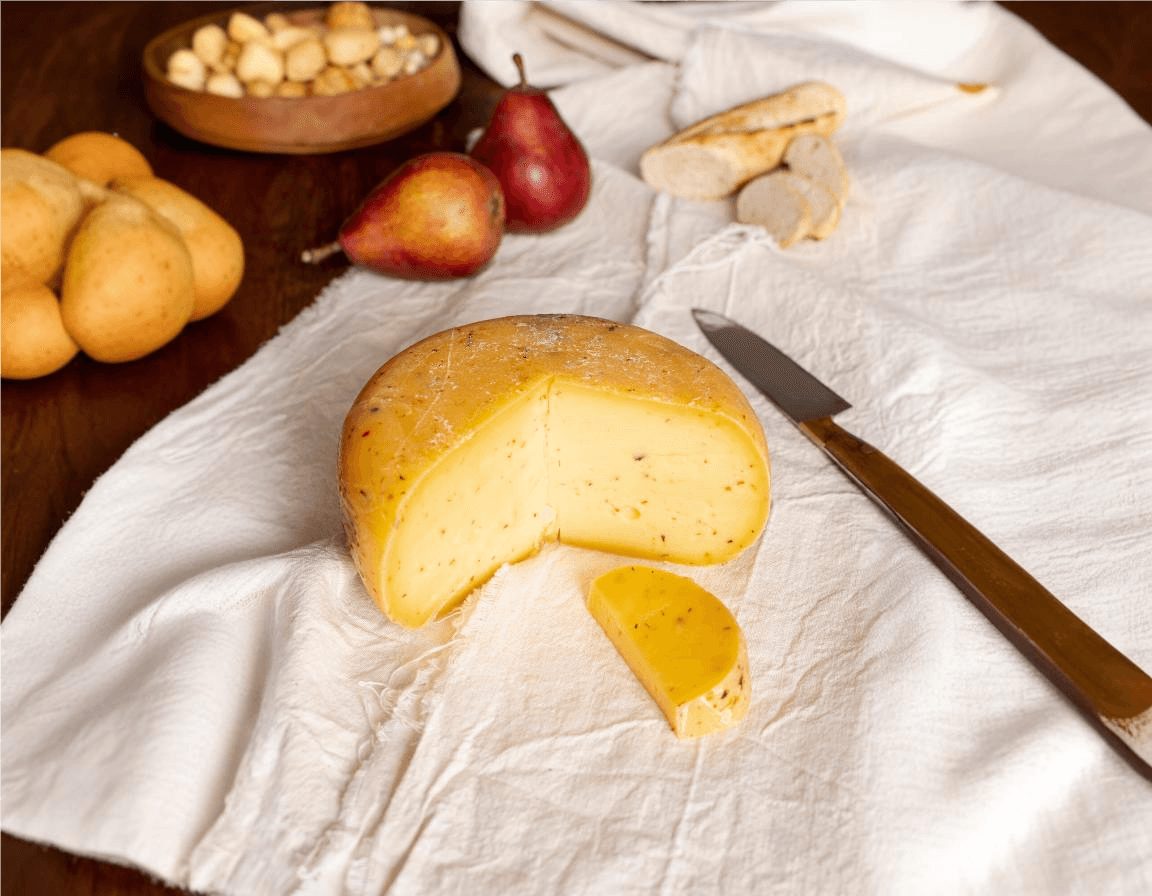What Makes Gouda Cheese Unique?
Gouda cheese stands out for its distinctive flavor and versatility, making it a favorite among cheese enthusiasts. This semi-hard cheese originates from the Netherlands and boasts a rich, creamy texture. It’s known for its characteristic nutty and slightly sweet taste, which deepens as the cheese ages.
A unique feature of Gouda cheese is its wax-coated rind, which helps preserve its moisture and flavor during the aging process. Younger Gouda has a softer, creamier texture, while aged varieties develop a firmer consistency and a sharper, more complex flavor profile. Transitioning from mild to robust, Gouda caters to diverse taste preferences.
Moreover, Gouda cheese is crafted from both pasteurized and unpasteurized milk, adding to its variety. Its versatility shines in culinary applications, from sandwiches to gourmet dishes. Whether melted or sliced, Gouda cheese delivers a delightful experience that appeals to a wide audience.
To explore complementary cheese options, you might enjoy blue cheese, which offers its own bold flavor profile.
How to Choose the Perfect Gouda Cheese for Your Recipe
Selecting the right Gouda cheese for your recipe is essential to achieving the desired flavor and texture. The first factor to consider is the cheese’s age. Young Gouda, typically aged for one to six months, offers a mild, creamy flavor ideal for melting in dishes like casseroles or grilled cheese sandwiches. Aged Gouda, which matures for over a year, has a bold, nutty taste that complements charcuterie boards and savory recipes.
When shopping, inspect the cheese’s texture. High-quality Gouda should feel smooth and free of cracks. If possible, sample the cheese to ensure it aligns with your recipe’s flavor profile. Additionally, consider specialty varieties like smoked Gouda, which adds a rich, smoky note to dishes.
Packaging is also crucial. Look for cheese sealed in wax or vacuum-packed for optimal freshness. Properly stored, Gouda cheese can elevate any dish, from appetizers to main courses, with its exceptional taste.
A hallmark of Gouda cheese is its wax-coated rind, preserving moisture and enhancing its taste during aging. Younger Gouda is soft and creamy, while aged versions deliver a sharper, more complex flavor. This dynamic range makes Gouda an excellent pairing with other cheeses, such as those highlighted in cottage cheese recipes, for an array of culinary innovations.
The History and Origins of Gouda Cheese
The origins of Gouda cheese trace back to the Netherlands, where it was first produced in the city of Gouda during the 12th century. Despite its name, Gouda cheese wasn’t exclusively made in this region but was primarily traded there, making the city synonymous with the cheese.
Traditionally, Gouda cheese was handcrafted using methods passed down through generations. Farmers’ markets in Gouda were the central hub for selling this iconic cheese. Over time, it gained recognition for its quality and unique flavor, becoming a staple in Dutch culture.
The name “Gouda” is not protected by geographical indication, which means it can be produced worldwide. However, authentic Dutch Gouda, labeled as “Gouda Holland,” is made from locally sourced milk and adheres to strict standards.
Today, Gouda cheese remains a symbol of Dutch heritage, celebrated globally for its rich history and delectable taste.
Creative Recipes Featuring this cheese
Gouda cheese is a versatile ingredient that elevates a variety of dishes. Here are some creative ways to incorporate it into your cooking:
- Gouda-Stuffed Chicken Breasts: Fill chicken breasts with shredded Gouda and spinach for a creamy, flavorful dinner.
- Smoked Gouda Mac and Cheese: Combine smoked Gouda with pasta for a rich, smoky twist on a classic comfort food.
- Gouda Cheese Fondue: Melt Gouda with white wine and garlic for a decadent dipping sauce.
- Gouda and Mushroom Risotto: Stir grated Gouda into creamy risotto for an earthy, cheesy flavor.
- Gouda-Topped Burgers: Add a slice of Gouda to your favorite burger for a gourmet touch.
These recipes showcase Gouda cheese’s ability to transform simple dishes into culinary masterpieces.
Melting Tips for the Perfect Gouda Cheese Dish
Melting This cheese requires attention to detail to achieve the best results. First, select the right Gouda. Younger varieties melt more smoothly due to their higher moisture content. Aged Gouda, while flavorful, is better suited for grating over dishes rather than melting.
To melt Gouda, shred or slice it thinly for even heating. Use low to medium heat to prevent clumping or burning. Stir frequently to ensure a smooth consistency. Adding a splash of milk or cream can enhance the cheese’s creaminess when melted.
For dishes like fondue or cheese sauces, a pinch of cornstarch mixed with the cheese can help achieve a velvety texture. With these tips, you can enjoy perfectly melted Gouda cheese in every recipe.
It stands out for its distinctive flavor and versatility, making it a favorite among cheese enthusiasts. This semi-hard cheese originates from the Netherlands and boasts a rich, creamy texture.
Nutritional Benefits of Gouda Cheese
Beyond its delicious taste, It offers several nutritional benefits. It’s an excellent source of calcium, supporting strong bones and teeth. Additionally, Gouda is rich in protein, making it a satisfying snack or ingredient in balanced meals.
This cheese also contains vitamin K2, which plays a vital role in bone health and cardiovascular function. Its fat content provides essential energy, though it’s best enjoyed in moderation. Gouda’s probiotics promote gut health, contributing to overall well-being.
Whether you’re enjoying it as a snack or in a recipe, It delivers both flavor and nutrition, making it a valuable addition to a healthy diet.
Storage and Preservation Tips for Gouda Cheese
Proper storage is key to maintaining the freshness and flavor of this cheese. Wrap the cheese tightly in wax paper or parchment paper, then place it in a resealable plastic bag or airtight container. This method allows the cheese to breathe while preventing it from drying out.
Store Gouda cheese in the refrigerator’s cheese drawer or a similar area with consistent temperature and humidity. Avoid freezing Gouda, as it can alter the cheese’s texture and flavor.
If mold develops on the surface, simply cut it away, ensuring the remaining cheese is unaffected. Following these tips will help you enjoy your Gouda cheese at its best for weeks.
The Difference Between Aged and Young Gouda Cheese
The distinction between aged and young Gouda cheese lies in their texture, flavor, and culinary uses. Young Gouda, aged for up to six months, has a creamy, smooth texture with a mild, buttery flavor. It melts easily, making it ideal for dishes like grilled cheese sandwiches and pasta.
Aged Gouda, matured for over a year, develops a firmer texture and a deep, nutty flavor with hints of caramel. Its robust taste makes it perfect for pairing with wine or adding complexity to gourmet recipes. The aging process also enhances its nutritional profile, increasing calcium and protein content.
When selecting between aged and young Gouda, consider the recipe and desired flavor intensity. Each type brings unique qualities to your dishes, ensuring a versatile cooking experience.
Aged Gouda, with its robust, nutty profile, is perfect for gourmet dishes and charcuterie boards. When crafting dishes like smoked salmon and cheese pairings, consider inspirations such as salmon roe for a luxurious touch.
Popular Dishes Around the World with this cheese
It features prominently in cuisines worldwide, showcasing its adaptability. In the Netherlands, it’s a staple in kaasbroodjes, a cheesy pastry popular as a snack. The United States celebrates Gouda in mac and cheese recipes, where its creamy texture shines.
In France, Gouda enhances quiches and gratins, adding a savory depth. Mexican dishes incorporate Gouda into quesadillas and enchiladas for a rich, cheesy filling. In Italy, Gouda is used in fusion pizzas alongside traditional mozzarella, offering a unique twist.
Whether it’s baked, melted, or grated, Gouda cheese elevates these dishes with its versatile flavor profile, making it a favorite ingredient globally.
How this Cheese Enhances the Flavor of Your Meals
It transforms ordinary meals into extraordinary culinary experiences. Its creamy texture and nutty flavor add depth to soups and sauces, creating a velvety finish. In baked dishes, Gouda melts beautifully, forming a golden, bubbly crust that enhances both appearance and taste.
The cheese’s versatility means it pairs seamlessly with a variety of ingredients. Its mild sweetness complements savory meats, while its robust aged version balances sweeter elements like caramelized onions or fruits. Transitioning from mild to bold, Gouda adapts to any dish, providing a satisfying flavor boost.
Incorporating Gouda into your meals ensures a delicious, memorable dining experience every time.
Substitutes and Alternatives
If it is unavailable, several substitutes can replicate its flavor and texture. Young Gouda can be replaced with mild cheddar or Monterey Jack, both of which offer a similar creamy consistency and mild taste. For aged Gouda, Parmesan or Gruyère are excellent alternatives, delivering a comparable nuttiness and firm texture.
Smoked Gouda’s unique flavor can be mimicked using smoked mozzarella or provolone. For vegan options, cashew-based cheeses with a smoky or nutty profile work well in recipes calling for Gouda.
Choosing the right substitute depends on the dish and desired flavor, ensuring you achieve satisfying results without compromising quality.
For more cheese-based inspiration, try incorporating unique flavors from blue cheese or cottage cheese recipes.
Exploring its Versatility in Cooking
It is celebrated for its versatility, making it a staple in kitchens worldwide. It melts seamlessly into sauces and soups, providing a creamy, rich texture. In baked dishes like casseroles and lasagnas, Gouda’s golden crust and savory flavor enhance every bite.
It’s equally impressive in cold applications. Thin slices of Gouda elevate sandwiches, while shredded Gouda adds depth to salads. Smoked varieties introduce a unique flavor to burgers and wraps.
From breakfast omelets to gourmet dinners, Gouda cheese adapts to countless recipes, making it an essential ingredient for both home cooks and professional chefs.
FAQs :
What is special about Gouda cheese?
Gouda cheese is renowned for its rich, creamy texture and nutty, buttery flavor. It originates from the Netherlands and is one of the world’s oldest cheeses. The aging process of Gouda enhances its flavor, offering variations from mild and smooth to sharp and caramel-like in aged forms.
What is the best way to use Gouda cheese?
Gouda cheese is versatile and works well in various dishes. Use it in sandwiches, burgers, mac and cheese, or as a topping for baked dishes. It’s also excellent for melting in fondue or paired with fruits, nuts, and wine on a charcuterie board.
Is Gouda the healthiest cheese?
Gouda cheese offers health benefits, including protein, calcium, and vitamin K2, which supports bone health. However, it is higher in fat and sodium compared to some cheeses, so moderation is key for a balanced diet.
Is Gouda cheese better than cheddar cheese?
Gouda and cheddar cheeses each have unique qualities. Gouda is creamier and slightly sweet, while cheddar has a sharper taste. The choice depends on your preference and the dish you’re preparing, as both cheeses excel in different culinary uses.
Conclusion :
Gouda cheese offers a world of possibilities, from its creamy, meltable young varieties to its bold, aged counterparts. Whether exploring pairings with blue cheese, crafting recipes inspired by cottage cheese, or venturing into gourmet pairings with salmon roe, Gouda adapts to every palate. With its rich heritage and versatile flavor, it’s no wonder Gouda remains a beloved choice for cheese enthusiasts worldwide.


1 thought on “Gouda Cheese – Everything You Need to Know About This Iconic Delight”